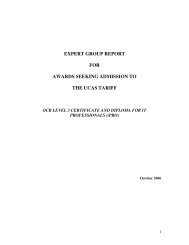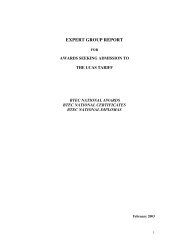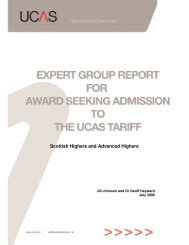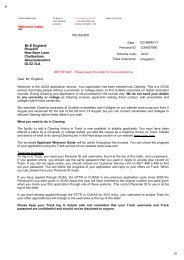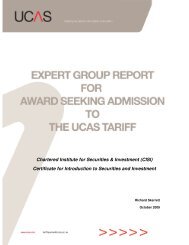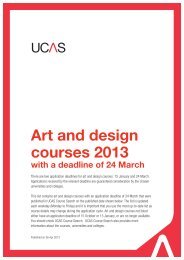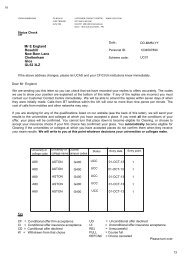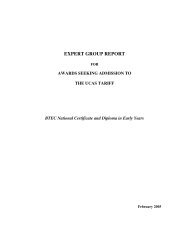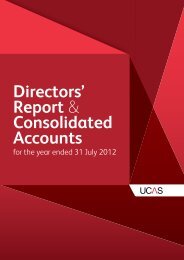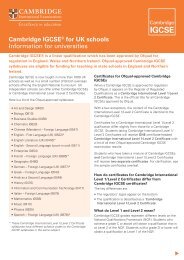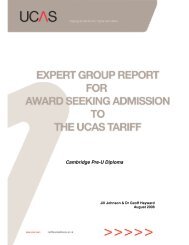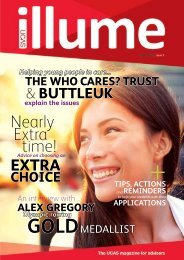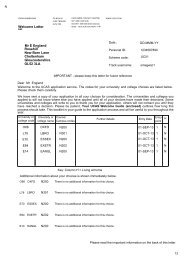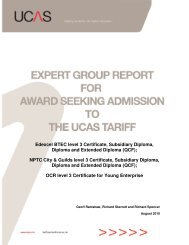International qualifications 2013 (pdf) - CUKAS
International qualifications 2013 (pdf) - CUKAS
International qualifications 2013 (pdf) - CUKAS
You also want an ePaper? Increase the reach of your titles
YUMPU automatically turns print PDFs into web optimized ePapers that Google loves.
Qualifications currently offered<br />
Master: A taught postgraduate course lasting one to two years<br />
(60-120 ECTS credits).<br />
Doctorate: Entry requirement: First degree plus a master’s degree<br />
or First Degree plus a pre-doctoral course in research<br />
methodology. A thesis is written after research normally lasting at<br />
least three years.<br />
Sri Lanka<br />
EVALUATION<br />
Sri Lanka Ordinary level<br />
Acceptable at grades A-C in lieu of GCSE on a subject for subject<br />
basis (with the exception of English language).<br />
Sri Lanka Advanced level<br />
Acceptable at grades A, B and C in lieu of GCE A Level on a<br />
subject for subject basis.<br />
GRADING SYSTEM<br />
O level (pre-2001)<br />
100 – 75% D Distinction<br />
74 – 50 C Credit<br />
49 – 35 S Pass<br />
34 – 0 F Fail<br />
O level (since 2001)<br />
100-75% A Distinction<br />
74-65% B Very good pass<br />
64-50% C Credit<br />
49-35% S Pass<br />
34-0% F Fail<br />
A level<br />
100 – 75% A Distinction<br />
74 – 65 B Very good pass<br />
64 – 55 C Credit<br />
54 – 40 S Ordinary pass (simple pass)<br />
39 – 0 W/F Weak<br />
EDUCATION SYSTEM<br />
Five years of primary education and six years of secondary<br />
education culminate in the Sri Lanka O level. A two-year<br />
collegiate course leads to A levels in a minimum of three<br />
subjects. Sinhala, Tamil and English are the media of instruction.<br />
English is taught as a secondary language from year one, but is<br />
not compulsory.<br />
ACCESS TO HIGHER EDUCATION<br />
Entrance to university in Sri Lanka is at A level standard for a<br />
three-year general or four-year honours degree. Candidates are<br />
required to have three A level passes, and sit a Common General<br />
paper and a General English paper, to assess their intellectual<br />
ability and general knowledge. The English paper is compulsory<br />
but applicants do not have to pass it to enter university.<br />
Professional courses tend to be taught in English, which is used<br />
also in the later stages of most other degrees.<br />
Sudan<br />
EVALUATION<br />
Sudan School Certificate (SSC)<br />
Acceptable at 50% or better in lieu of GCSE on a subject for<br />
subject basis (except English language). Would need to be<br />
supplemented by Advanced GCE, SQA awards or an equivalent<br />
qualification.<br />
GRADING SYSTEM<br />
A 100 – 80%<br />
B 79 – 70<br />
C 69 – 60<br />
D 59 – 50<br />
49 and below is a fail<br />
The percentage is calculated from the four compulsory subjects<br />
plus the three highest optional subjects.<br />
EDUCATION SYSTEM<br />
Education in Sudan comprises eight years of basic education and<br />
three years of secondary education. The three-year academic<br />
secondary school course ends with the School Certificate<br />
examinations. Certificates are awarded provided students have<br />
passes in four compulsory subjects (Arabic, English, mathematics<br />
and Islamic or Christian religion), plus one or more optional<br />
subjects or three compulsory passes (including Arabic language),<br />
plus two or more optional subjects. The third year of secondary<br />
education involves a choice between arts and science streams.<br />
The medium of instruction is Arabic, but English language is<br />
compulsory from the 5th grade of basic school education.<br />
ACCESS TO HIGHER EDUCATION<br />
Passes at 50% in the SSC examinations or equivalent certificates<br />
qualify candidates for entry to a four-five year general/honours<br />
degree in the Sudan, although some institutions require higher<br />
marks (70–80%). In competitive areas such as medicine and<br />
engineering the minimum percentage required is 83.3% or<br />
74.3% respectively. The Ministry of Higher Education and<br />
Scientific Research is the government body responsible for Higher<br />
Education.<br />
Sweden<br />
EVALUATION<br />
Slutbetyg från Grundskola (School Leaving Certificate from<br />
compulsory education)<br />
Acceptable at grade G or better in lieu of GCSE on a subject for<br />
subject basis (except English language).<br />
Slutbetyg/Examensbevis från Gymnasieskolan (School Leaving<br />
Certificate from Upper Secondary Education)<br />
Slutbetyg/Examensbevis från Gymnasial Vuxenutbildning<br />
(Certificate from Municipal Upper Secondary Adult Education)<br />
Acceptable as group <strong>qualifications</strong> that satisfy general entrance<br />
requirements, provided that three years at upper secondary<br />
school have been completed.<br />
During a transition period there will be pupils with school<br />
leaving certificates from two different upper secondary<br />
education systems. In the former system, pupils will receive a<br />
Slutbetyg if they started their programme before 1July 2011<br />
and, in the new system, pupils will receive an Examensbevis if<br />
they started their programme after 1 July 2011. For pupils in<br />
Gymnasial Vuxenutbildning the new system will be in place<br />
from 1 July 2012.<br />
GRADING SYSTEM<br />
In both systems the grades are criteria-related and students<br />
receive a grade on the completion of each course. However, in<br />
the system where there are Slutbetyg the top grade of MVG<br />
(Pass with special distinction) is given only when the pupil’s<br />
results are exceptional.<br />
INTERNATIONAL QUALIFICATIONS 57



